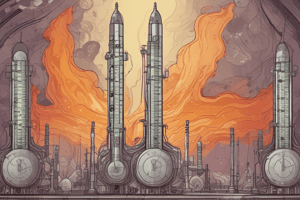Podcast
Questions and Answers
What is the unit of heat capacity?
What is the unit of heat capacity?
What is the mode of heat transfer that occurs through the movement of fluids?
What is the mode of heat transfer that occurs through the movement of fluids?
What is the term for the heat energy required to change the state of a substance?
What is the term for the heat energy required to change the state of a substance?
What is the purpose of thermometry?
What is the purpose of thermometry?
Signup and view all the answers
What is the zeroth law of thermodynamics?
What is the zeroth law of thermodynamics?
Signup and view all the answers
What is the term for the heat energy required to change 1 kg of a substance from solid to liquid?
What is the term for the heat energy required to change 1 kg of a substance from solid to liquid?
Signup and view all the answers
What is the absolute temperature scale?
What is the absolute temperature scale?
Signup and view all the answers
What is the mode of heat transfer that occurs through electromagnetic waves?
What is the mode of heat transfer that occurs through electromagnetic waves?
Signup and view all the answers
Study Notes
Temperature and Thermometry
- Temperature: a measure of the average kinetic energy of particles in a substance
- Thermometry: the measurement of temperature
- Common temperature scales:
- Celsius (°C): water freezes at 0°C and boils at 100°C
- Fahrenheit (°F): water freezes at 32°F and boils at 212°F
- Kelvin (K): absolute temperature scale, water freezes at 273 K and boils at 373 K
Heat Transfer
- Heat: energy transferred from one body to another due to a temperature difference
- Three modes of heat transfer:
- Conduction: heat transfer through direct contact between particles
- Convection: heat transfer through the movement of fluids
- Radiation: heat transfer through electromagnetic waves (e.g. light, radio waves)
Heat Capacity and Specific Heat
- Heat capacity: the amount of heat energy required to change the temperature of a substance by 1°C
- Specific heat: the heat capacity of a substance per unit mass
- Units: J/kg°C or J/g°C
Latent Heat
- Latent heat: the heat energy required to change the state of a substance (e.g. solid to liquid, liquid to gas)
- Latent heat of fusion: the heat energy required to change 1 kg of a substance from solid to liquid
- Latent heat of vaporization: the heat energy required to change 1 kg of a substance from liquid to gas
Laws of Thermodynamics
- Zeroth Law: if two systems are in thermal equilibrium with a third system, they are also in thermal equilibrium with each other
- First Law: energy cannot be created or destroyed, only converted from one form to another
- Second Law: the total entropy of a closed system always increases over time
- Third Law: as the temperature of a system approaches absolute zero, its entropy approaches a minimum value
Temperature and Thermometry
- Temperature is a measure of the average kinetic energy of particles in a substance.
- Thermometry is the measurement of temperature.
- Celsius (°C) scale: water freezes at 0°C and boils at 100°C.
- Fahrenheit (°F) scale: water freezes at 32°F and boils at 212°F.
- Kelvin (K) scale: absolute temperature scale, water freezes at 273 K and boils at 373 K.
Heat Transfer
- Heat is energy transferred from one body to another due to a temperature difference.
- Conduction: heat transfer through direct contact between particles.
- Convection: heat transfer through the movement of fluids.
- Radiation: heat transfer through electromagnetic waves (e.g. light, radio waves).
Heat Capacity and Specific Heat
- Heat capacity is the amount of heat energy required to change the temperature of a substance by 1°C.
- Specific heat is the heat capacity of a substance per unit mass.
- Units of heat capacity and specific heat are J/kg°C or J/g°C.
Latent Heat
- Latent heat is the heat energy required to change the state of a substance (e.g. solid to liquid, liquid to gas).
- Latent heat of fusion: the heat energy required to change 1 kg of a substance from solid to liquid.
- Latent heat of vaporization: the heat energy required to change 1 kg of a substance from liquid to gas.
Laws of Thermodynamics
- Zeroth Law: if two systems are in thermal equilibrium with a third system, they are also in thermal equilibrium with each other.
- First Law: energy cannot be created or destroyed, only converted from one form to another.
- Second Law: the total entropy of a closed system always increases over time.
- Third Law: as the temperature of a system approaches absolute zero, its entropy approaches a minimum value.
Studying That Suits You
Use AI to generate personalized quizzes and flashcards to suit your learning preferences.
Description
Learn about temperature and its measurement, and how heat is transferred between bodies due to temperature differences. Explore Celsius, Fahrenheit, and Kelvin temperature scales.




